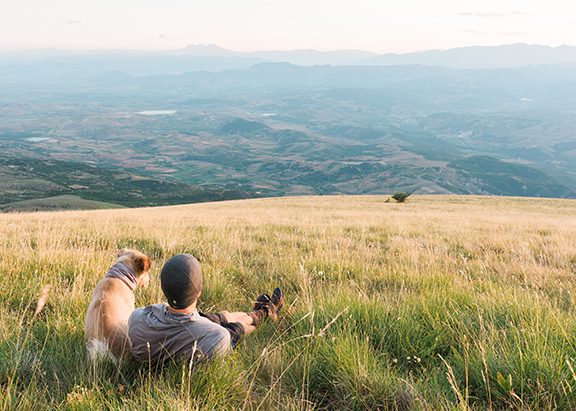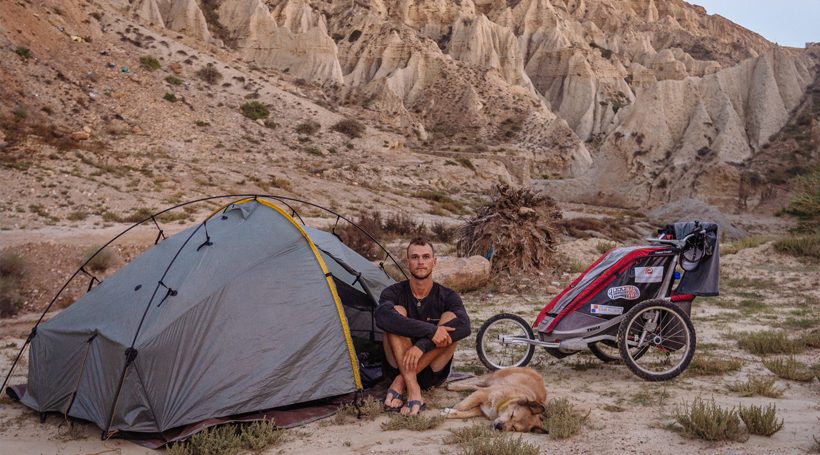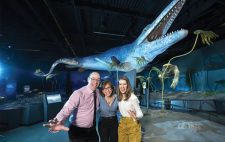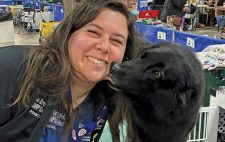In 2015, Tom Turcich left his home in Haddon Twp. to spend the next 5 years walking around the world. He decided to take the adventure after the death of 2 of his 17-year-old friends left him wanting to get more out of life. The pandemic ended up adding 2 years to the trip, but in the end, Turcich walked through 7 continents with his dog Savannah, pulling a baby stroller stashed with necessities. He arrived home last month.
A few days after coming home, Turcich sat down with SJ Mag’s Marianne Aleardi in front of a live audience at his alma mater, Haddon Township High School.

Q: Since you’ve been home, have you gone for a walk – or will you never go on a walk again?
I definitely still go for walks. It’s very calming for me still. I went out for an hour walk with Savannah this morning to clear my thoughts. I think I’ll be taking walks forever.
Q: What’s the most beautiful thing you saw?
There’s a lot, but I would say the country of Kurdistan. People call it the Switzerland of Central Asia. It’s just mountain after mountain after mountain after mountain, and the only way to see the country is by horseback. I had a guide, and we went out with 2 horses. It’s just untouched, gorgeous mountain valleys.
Q: How did you get Savannah? How did you know she would be ok on the walk?
I adopted her in Austin, Texas after about 4 months of walking. After camping on my own so much, I realized it would be nice to have a dog listening while I slept. I got her when she was a puppy, so I figured she would grow up on the road and just adapt. That bore out. A lot of the Central American cities can be pretty chaotic. So I had my cart and Savannah wrapped tightly around the leash, and we were navigating these moto taxis and pushcarts and all these people – it was just chaos. We had to be one unit. We were so synced up that after that, everything was pretty easy.

Tom Turcich spoke with SJ Mag’s Marianne Aleardi at Haddon Twp. High School, his alma mater
Q: Did people like meeting Savannah?
Yeah, for sure, especially in Europe and Turkey, where people are generally friendlier to dogs. In Central and South America, there’s a lot of strays and they’re treated really poorly. So people are rightfully afraid of dogs. There were a lot of times I would turn a corner and the person would scream when they saw Savannah. But in the cities, people were more accustomed to dogs, and they’d be really welcoming. They loved Savannah.
Q: Was there ever a time you were in danger?
One time in Turkey I was crossing this mountain close to the Syrian border. I didn’t know there was terrorist activity up there. I was about to crest the mountain, and these 2 guys on a motorcycle jumped off and pointed a shotgun at me. It was kind of like when you would play hide and seek as a kid and someone opens the bushes and it’s just like, they got you. It’s like, if they want to, it’s game over for you. I thought oh, man, they’re gonna blow a hole in my chest. But it ended up they were plain clothes military. It took about 3 hours to resolve, and they had shotguns on me the whole time. They didn’t speak English and I spoke very little Turkish. They took me to a substation up in the mountains and I had 11 guys grilling me. I showed them my license, I showed my passport – but it wasn’t until I got a little bit of internet service and showed them my Instagram page – then they loved me. We were best friends after that.
Q: Can you describe a food you liked that most people probably never heard of?
It’s called cuy. There’s a community of indigenous people up in the mountains of the Andes, and I saw people grilling something on a spit – it was a guinea pig. I figured I’m here, I have to try it, but it was really not good. The skin was like leather. The meat was ok but there was so little. Then I told my Peruvian friend I had it and didn’t like it, and he said, “Oh, no, no, you haven’t had it prepared right.” He took me to a nice restaurant in Lima, and it was fantastic there.
Q: How did you keep in touch with your parents?
There’s pretty good internet almost everywhere, so at least once every 2 weeks, we could FaceTime. I don’t think I could have done this 20 years ago. The phone is such a multi-tool. I used it for translating, directions, the weather, for so many things
Q: When you arrive in a country, how do you walk up to someone and start talking?
They probably noticed me first because I’m a tall, lanky, white boy with a dog and a baby carriage. In the Americas, it was easy, my Spanish was really good. In other countries, like Algeria or even when I got into Central Asia, there’s very little English. I had to learn a little French and a touch of Russian. But you can almost always find someone who speaks a little English. If that doesn’t work, there’s Google Translate. But if there’s no internet connection, you just get comfortable with yourself. You can always get food and water. I’ve learned to become very comfortable sitting in a room where I don’t speak the language. And I’m just like, “Hey, here I am.”
Q: Did everyone welcome you?
Depends on the country. People are very friendly everywhere. But for example, in the Soviet Bloc, people would never smile at you on the street. If you waved to them, they would wave back right away, but they’re never going to be the first wave. Whereas the Turks, they’re super open and warm, and they will say hello to you right away. I remember coming to some little towns in Peru, out in the dessert, and people would come up and give me fruit. Anytime I came to some little town in the middle of nowhere, it’s almost guaranteed that they would be excited to have this random person pass through.
Q: What was your worst moment?
The worst would be the few months after I was ill. I had this bacterial infection that knocked me out for about 7 months. I was in pain all the time for 3 months. I barely slept. When I was physically able to come back, I started in Denmark. But my thoughts bent towards the negative, whereas normally, they lean towards the positive. I was like, what the hell am I doing out here? Everything just becomes unbearable when you’re not in a good place mentally.
Q: How did Covid affect you?
It stopped me. I got stuck in Azerbaijan for 6 months, which was a good, cool place to be stuck. There were a couple of emergency flights to the U.S. but they weren’t accepting dogs. Covid disrupted a lot of the walk. I missed Kazakhstan, Mongolia and Australia.
Q: What did you learn?
I learned a few things. People are good everywhere. That’s the main takeaway. You need to be compassionate with yourself and radically compassionate with others. Democracy is a better system, and obviously everyone here agrees with that. I’ve seen that firsthand. I would cross from an autocracy or dictatorship into a democracy and see the effect it had on people. It’s easy to see the effects of good governance. It’s the only way the average person kind of has a chance of living a safe, prosperous life.
Q: What is your impression of people around the world?
People are good everywhere. For the most part, people are happy. They’re all the same. They want to work a little bit and spend time with their family. In America, we have massive houses, but that’s not normal. In most countries people are packed into a little house they share with 3 generations. They might even be happier, because they’re with their family.














